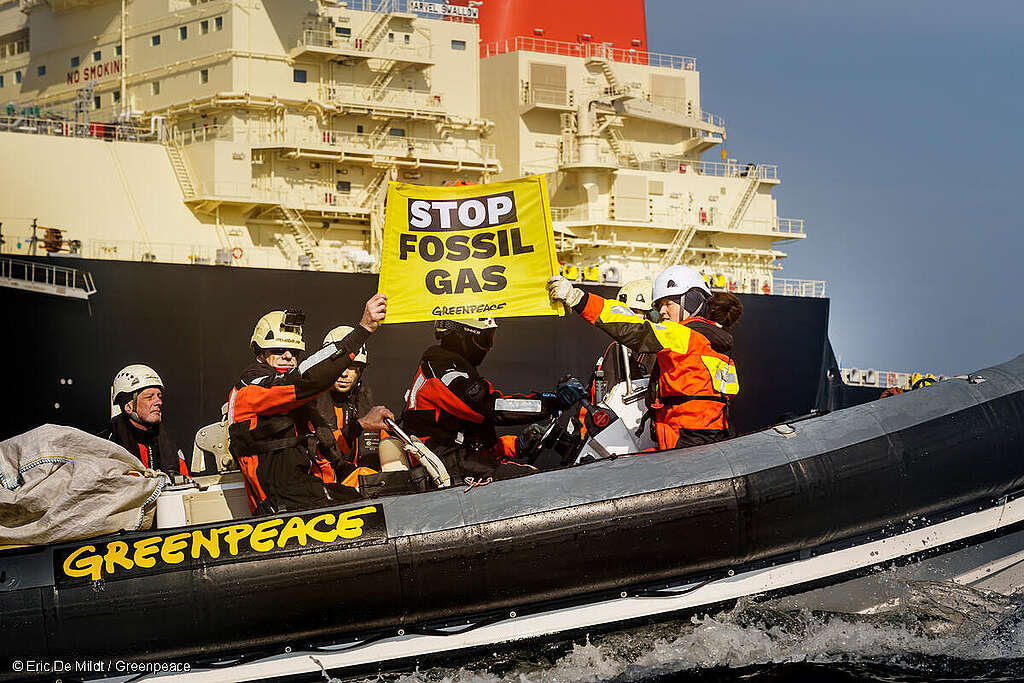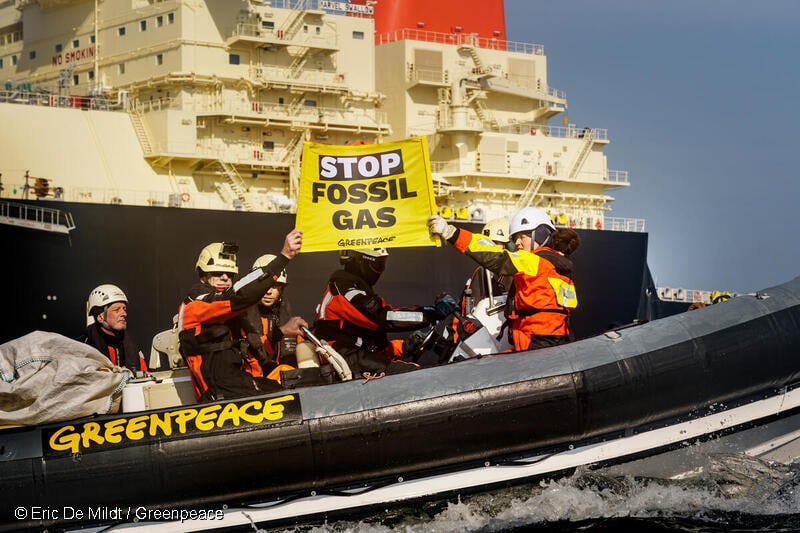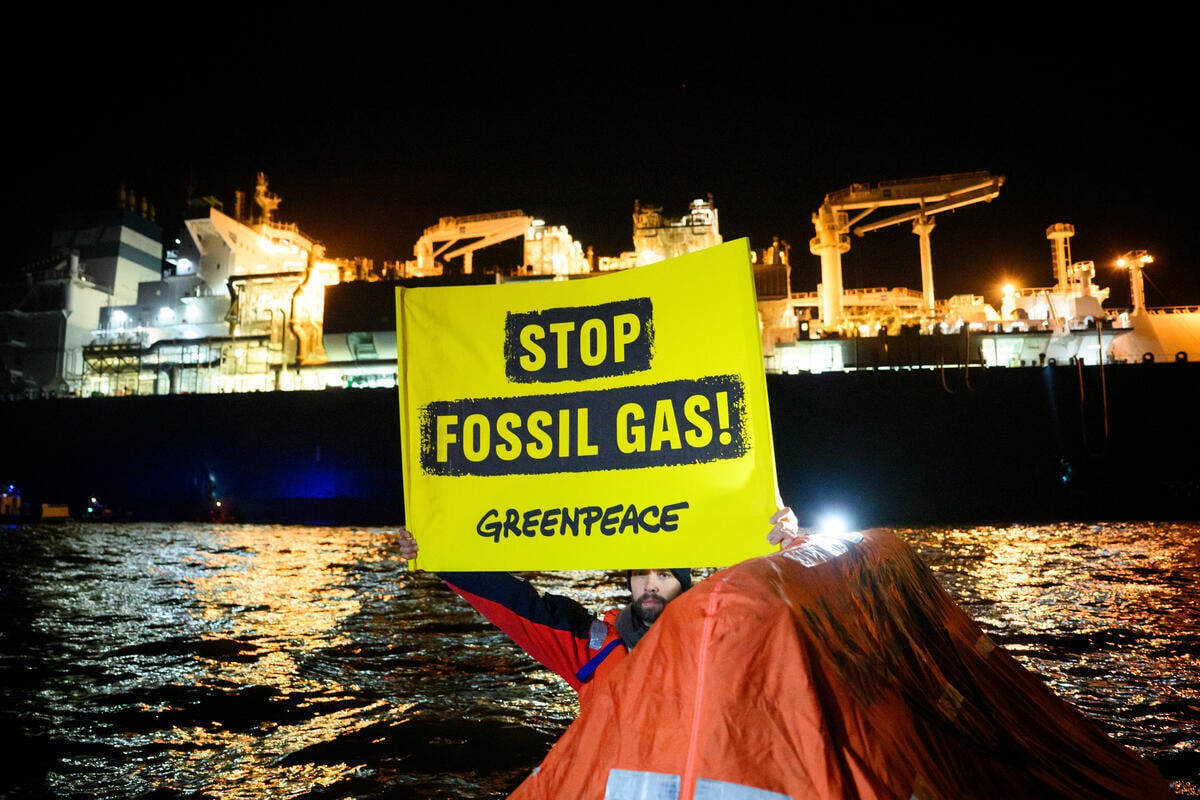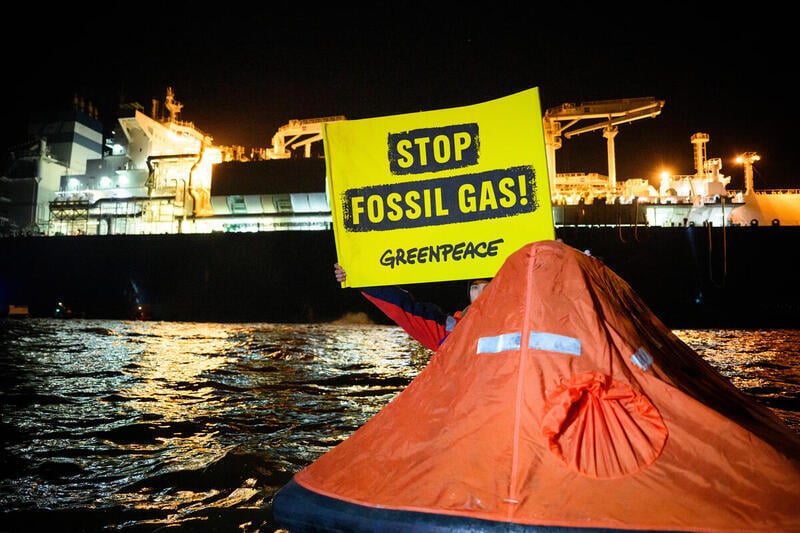The European Union imports almost 60% of the energy it consumes – the vast majority of those imports are fossil fuels. In particular, Europe is currently highly dependent on fossil gas for generating electricity, heating buildings and in chemical production. The EU’s imports of fossil gas are accelerating climate breakdown, funding war and authoritarian regimes, and driving up energy bills. After the full-scale invasion of Ukraine in early 2022, cutting the EU’s reliance on Russia for energy – fossil gas in particular – was top of the political agenda. Unfortunately, politicians focused more on finding other sources of dirty fuels instead of moving Europe away from fossil fuels all together.

Cutting fossil fuels out of our energy system, including fossil gas, and moving to 100% renewable energy, would cut energy bills for people and companies in Europe, create more high-value and sustainable jobs, boost local solutions that meet people’s needs, and protect nature. With the right planning, Europe could completely phase out fossil gas in the next ten years, and replace this dirty energy system with one that’s independent, democratic and fully based on renewables.
Here’s five ways how:
- Tax big oil and gas companies to fund a fair energy transition
The European Commission says that a total investment of €1,507 billion will be needed annually for the EU to meet its climate target of reducing climate-heating emissions by 90% by the year 2040. Massive investment is needed to meet the EU’s goals of cutting energy waste and increasing renewable energy, but instead we see investments in fossil fuels have increased from $29 billion in 2019 to $36 billion in 2024 in the EU. It’s time to reverse this trend and make that money flow to renewable energy, projects to cut energy waste and upgrades to infrastructure like upgrading and expanding the European power grid to accommodate higher levels of renewable electricity.
The EU must increase the ‘social climate fund’ money that goes to households and small or medium businesses to help them benefit from the move to clean energy. Big polluters should be made to pay, starting with a top-up tax on fossil fuel companies’ profits – the five biggest oil and gas companies have made $281 billion in profits since 2021, and the industry still gets huge amounts of public money in the EU (€123 billion in 2022).
At the same time, the EU must make good use of the European Investment Bank’s power to secure funding for large-scale renewable energy and infrastructure projects like grid upgrades to integrate more renewables and make it more robust. The EU’s national governments must properly use the EU’s ‘recovery and resilience’ funds to support green transition projects, particularly those that cut Europe’s dependence on fossil fuels and bring people’s bills down.
- Save energy through large-scale renovations
Cutting energy waste is essential to energy security. Around 50% of all the energy consumed in the EU is used for heating and cooling, and more than 70% of all energy still coming from fossil fuels there is plenty of room for improvement.
To meet its commitments in the Paris climate agreement, the EU must cut energy demand by 20.7% – which would hugely reduce European reliance on imported fossil fuels. Strengthening insulation, upgrading heating systems, and making manufacturing more energy efficient can save as much fossil gas every year as Denmark’s entire energy consumption.
To make these savings, the EU must make renovations more accessible and more affordable through a massive programme to insulate buildings, starting with low-income households and other vulnerable people. This will not only reduce energy waste, but also combat energy poverty, ensuring a fair and inclusive transition.
- Double renewable energy capacity by 2030
To make the EU energy independent requires a massive increase of renewable energy sources, particularly wind and solar power. The EU must double the amount of renewable electricity generation capacity installed by 2030 (from 640 gigawatts today to a target of 1,250 gigawatts in 2030). This will need annual investments of €1.8 trillion until 2030, and €1.07 trillion for the decade after that.
To unlock the huge investments needed, and deliver these projects, the European Commission must support energy cooperatives and other community-based organisations to put renewable energy production in the hands of ordinary people. Power generation owned by citizens and communities gives true energy independence, allows people to finance and benefit from renewable projects, and increases public support for the energy transition.
To deal with all this additional renewable electricity, the power grid must be upgraded too, with a 47% increase in long-distance electricity transmission needed by 2030. The EU’s national governments must cooperate on cross-border investments in the grid, and joint renewable energy projects. Switching heating systems in residential buildings and the industrial sector away from burning fuel and towards heat pumps and other electric heating is also crucial.
- Plan the 2035 fossil gas phase out
Boosting the deployment of renewable energy and cutting energy waste must go hand-in-hand with a clear target to phase out fossil fuels, and to secure a sustainable energy future. To make this happen in smooth way, the EU must initiate a coordinated phase-out, particularly of coal by 2030 and fossil gas by 2035 across all sectors. To give people, companies and investors clarity and stability, there should be binding national targets for each sector to reduce their fossil fuel use on the way down to zero.
Industries that are today heavily reliant on fossil fuels, particularly when they need high temperatures like for making steel and glass, need investments in scalable clean alternatives. The EU must also commit to a fossil-free, renewable-based electricity sector by 2035 through concrete EU and national fossil gas phase-out plans with intermediate targets – including significant cuts in methane pollution, as this super potent greenhouse gas risks supercharging the climate crisis.
- Ban new fossil fuel infrastructure projects
If we don’t stop new fossil fuel infrastructure coming online, we’ll get further locked into dependence on these dirty fuels. New gas power plants, liquified gas terminals, pipelines, and drill sites are not needed to cover our current energy needs, but are still pushed and financed by the EU and national governments. The EU has the power to ban all new fossil fuel projects – a crucial first step to a fossil-free future, to stop adding new fuel to the fire.
A ban on new projects would make the EU’s intention to transition away from fossil fuels clear, and would set a global precedent. By stopping new fossil fuel projects, the EU can direct attention and financial support to the clean energy transition, ensuring that future investments contribute to a sustainable, renewable-based independent energy system. This is what true energy security looks like.
Join the fight for a fossil-free, independent, democratic energy future for Europe.
Sign the Open Letter demanding the EU and national governments to ban all new fossil fuel projects



